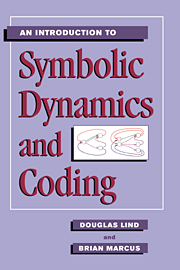Book contents
- Frontmatter
- Contents
- PREFACE
- CHAPTER 1 SHIFT SPACES
- CHAPTER 2 SHIFTS OF FINITE TYPE
- CHAPTER 3 SOFIC SHIFTS
- CHAPTER 4 ENTROPY
- CHAPTER 5 FINITE-STATE CODES
- CHAPTER 6 SHIFTS AS DYNAMICAL SYSTEMS
- CHAPTER 7 CONJUGACY
- CHAPTER 8 FINITE-TO-ONE CODES AND FINITE EQUIVALENCE
- CHAPTER 9 DEGREES OF CODES AND ALMOST CONJUGACY
- CHAPTER 10 EMBEDDINGS AND FACTOR CODES
- CHAPTER 11 REALIZATION
- CHAPTER 12 EQUAL ENTROPY FACTORS
- CHAPTER 13 GUIDE TO ADVANCED TOPICS
- BIBLIOGRAPHY
- NOTATION INDEX
- INDEX
CHAPTER 11 - REALIZATION
Published online by Cambridge University Press: 30 November 2009
- Frontmatter
- Contents
- PREFACE
- CHAPTER 1 SHIFT SPACES
- CHAPTER 2 SHIFTS OF FINITE TYPE
- CHAPTER 3 SOFIC SHIFTS
- CHAPTER 4 ENTROPY
- CHAPTER 5 FINITE-STATE CODES
- CHAPTER 6 SHIFTS AS DYNAMICAL SYSTEMS
- CHAPTER 7 CONJUGACY
- CHAPTER 8 FINITE-TO-ONE CODES AND FINITE EQUIVALENCE
- CHAPTER 9 DEGREES OF CODES AND ALMOST CONJUGACY
- CHAPTER 10 EMBEDDINGS AND FACTOR CODES
- CHAPTER 11 REALIZATION
- CHAPTER 12 EQUAL ENTROPY FACTORS
- CHAPTER 13 GUIDE TO ADVANCED TOPICS
- BIBLIOGRAPHY
- NOTATION INDEX
- INDEX
Summary
Invariants such as entropy, zeta function, and the dimension pair play an important role in studying shifts of finite type and sofic shifts. What values can these invariants take? Which numbers are entropies, which functions are zeta functions, which pairs are dimension pairs? Answers to these kinds of questions are called realization theorems.
In §11.1 we completely answer the entropy question. There is a simple algebraic description of the possible entropies of shifts of finite type and of sofic shifts. This amounts to characterizing the spectral radii of nonnegative integral matrices.
We focus on zeta functions in §11.2. Theorem 6.4.6 (see also Corollary 6.4.7) shows that the zeta function of an edge shift contains the same information as the nonzero spectrum of the adjacency matrix. Thus characterizing zeta functions of shifts of finite type is the same as characterizing the nonzero spectra of nonnegative integral matrices. We state an important partial result due to Boyle and Handelman [BoyH1].
The proof of this result is too complicated to include here, but we illustrate some of the main ideas involved by treating some special cases such as when all eigenvalues are integers. A remarkable feature of this work is that a significant theorem in linear algebra is proved by using important tools from symbolic dynamics: the Embedding Theorem and the Masking Lemma from Chapter 10. At the end of §11.2, we state a complete characterization of zeta functions of mixing sofic shifts [BoyH1].
- Type
- Chapter
- Information
- An Introduction to Symbolic Dynamics and Coding , pp. 367 - 401Publisher: Cambridge University PressPrint publication year: 1995



